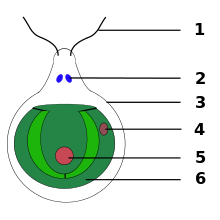

The eyespot apparatus (or stigma) is a photoreceptive organelle found in the flagellate or (motile) cells of green algae and other unicellular photosynthetic organisms such as euglenids. It allows the cells to sense light direction and intensity and respond to it, prompting the organism to either swim towards the light (positive phototaxis), or away from it (negative phototaxis). A related response ("photoshock" or photophobic response) occurs when cells are briefly exposed to high light intensity, causing the cell to stop, briefly swim backwards, then change swimming direction. Eyespot-mediated light perception helps the cells in finding an environment with optimal light conditions for photosynthesis. Eyespots are the simplest and most common "eyes" found in nature, composed of photoreceptors and areas of bright orange-red red pigment granules.[1] Signals relayed from the eyespot photoreceptors result in alteration of the beating pattern of the flagella, generating a phototactic response.[2]
- ^ Kreimer, G. (2009). "The green algal eyespot apparatus: A primordial visual system and more?". Current Genetics. 55 (1): 19–43. doi:10.1007/s00294-008-0224-8. PMID 19107486. S2CID 8011518.
- ^ Hegemann P (1997). "Vision in microalgae". Planta. 203 (3): 265–74. Bibcode:1997Plant.203..265H. doi:10.1007/s004250050191. PMID 9431675. S2CID 11933925.